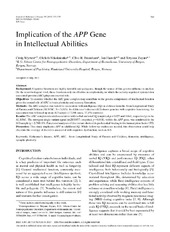| dc.contributor.author | Myrum, Craig | en_US |
| dc.contributor.author | Nikolaienko, Oleksii | en_US |
| dc.contributor.author | Bramham, Clive R. | en_US |
| dc.contributor.author | Haavik, Jan | en_US |
| dc.contributor.author | Zayats, Tetyana | en_US |
| dc.date.accessioned | 2018-02-13T14:03:45Z | |
| dc.date.available | 2018-02-13T14:03:45Z | |
| dc.date.issued | 2017 | |
| dc.Published | Myrum C, Nikolaienko O, Bramham CRE, Haavik J, Zayats T. Implication of the APP gene in intellectual abilities. Journal of Alzheimer's Disease. 2017;59(2):723-735 | eng |
| dc.identifier.issn | 1387-2877 | |
| dc.identifier.issn | 1875-8908 | |
| dc.identifier.uri | https://hdl.handle.net/1956/17390 | |
| dc.description.abstract | Background: Cognitive functions are highly heritable and polygenic, though the source of this genetic influence is unclear. On the neurobiological level, these functions rely on effective neuroplasticity, in which the activity-regulated cytoskeleton associated protein (ARC) plays an essential role. Objectives: To examine whether the ARC gene complex may contribute to the genetic components of intellectual function given the crucial role of ARC in brain plasticity and memory formation. Methods: The ARC complex was tested for association with intelligence (IQ) in children from the Avon Longitudinal Study of Parents and Children (ALSPAC, N = 5,165). As Alzheimer’s disease (AD) shares genetics with cognitive functioning, the association was followed up in an AD sample (17,008 cases, 37,154 controls). Results: The ARC complex revealed association with verbal and total IQ (empirical p = 0.027 and 0.041, respectively) in the ALSPAC. The strongest single variant signal (rs2830077; empirical p = 0.018), within the APP gene, was confirmed in the AD sample (p = 2.76E-03). Functional analyses of this variant showed its preferential binding to the transcription factor CP2. Discussion: This study implicates APP in childhood IQ. While follow-up studies are needed, this observation could help elucidate the etiology of disorders associated with cognitive dysfunction, such as AD. | en_US |
| dc.language.iso | eng | eng |
| dc.publisher | IOS Press | eng |
| dc.rights | Attribution CC BY-NC | eng |
| dc.rights.uri | http://creativecommons.org/licenses/by-nc/4.0/ | eng |
| dc.subject | Alzheimer’s disease | eng |
| dc.subject | APP | eng |
| dc.subject | ARC | eng |
| dc.subject | Avon Longitudinal Study of Parents and Children | eng |
| dc.subject | Dementia | eng |
| dc.subject | intelligence | eng |
| dc.subject | synaptic plasticity | eng |
| dc.title | Implication of the APP gene in intellectual abilities | en_US |
| dc.type | Peer reviewed | |
| dc.type | Journal article | |
| dc.date.updated | 2018-01-03T20:37:36Z | |
| dc.description.version | publishedVersion | en_US |
| dc.rights.holder | Copyright 2017 IOS Press and the authors | |
| dc.identifier.doi | https://doi.org/10.3233/jad-170049 | |
| dc.identifier.cristin | 1491481 | |
| dc.source.journal | Journal of Alzheimer's Disease | |

